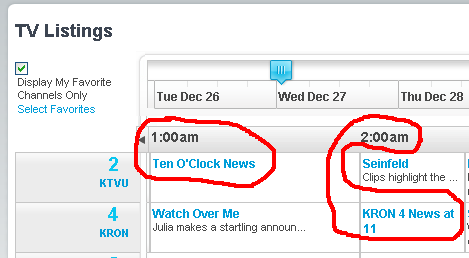I use
Thunderbird for e-mail, a mere 700MB of e-mail from Eudora, Netscape, Mac Mail, and corporate Exchange. I took a
survey. Here are my suggestions in more detail. They're keyed around several hassles:
- the hassle of subscribing to mailing lists and getting duplicates of messages, and messages that are on web archives
- the hassle of threaded discussions and all those chunks of >>> quoted message
- the hassle of attachments, that again exist on the web
integrate Find Duplicate message functionality
There's
extension that finds duplicates, but I want e-mail to detect them as they come in. If I get the same message several times (e.g. a personal reply and the message from mailing list), show me threaded with the one I prefer first, with an option for the rest to be flagged as less desirable. For example, if someone sends an e-mail to me and cc's to some mail lists I subscribe, I prefer keeping the original and deleting the ones that have the Yahoo Groups ad or Sourceforge.net promo line.
in threaded mode, detect and collapse previous quotations
The inconsiderate bozos who quote the entire message only to add "I agree" or "Thanks" need to be schooled (and bozos,
don't top-post!). Meanwhile the mail program can help. It could inline the followup comments. Or, for each followup message, add thin colored bars corresponding to quoted sections, and you can click on the colored bar to pop up the comment, or display it inlined with the current message. And, if I go on to read a follow-up, the e-mail could collapse the original bits of text in the follow-up, sort of what
Google Groups does
calendaring/address book/things smarts (e.g. turn e-mail into invitation)
This would detect "lunch tomorrow with Bob at Monk's and create a calendar appointment linking to Bob in Address Book, "Monk's coffee shop" as a Place (and its Web page), and back to the original e-mail. BUT, these linkages would also work in the current message. If I just have the text "Anna says we can install Minefield" in a folder called Beta, if I right-click on Anna or Minefield, the context menu can have a Related... submenu that should find the Anna Jones in recipients in the current folder, and find Minefield in subjects in the current folder.
Pensoft's Perspective PIM for
PenPoint could do this, it was addictive and it felt that the software learned about your life.
Better control over attachment handling
It's still a hassle. Often Thunderbird's HTML window or View Source window could do an acceptable job of showing the attachment (like a .eml or patch file), but I have to save and open from the O.S. and then clean up. I want options for thumbnail preview in attachment pane, quick view in new window, a submenu for Open with > Paint / Firefox / jpegcrop / Thunderbird's own HTML viewer / Thunderbird as plain text.
use the Operating Systems's file system attributes to associate files with the attachment
Thunderbird's "Detach attachment" option is nice, but the file in the file system has no idea where it came from and doesn't get the same tags that the mail message had.
option to replace a local messages with a link to the same message in an HTML archive
I subscribe to mailing lists, but they're also available in mail archives. I should be able to tell my e-mail program about the connection, then allow me to follow/copy the archive URL, and to replace my local message with a link (but still keep track of my tagging, my read status, my reply status, etc.). When I reply or forward, I should be easily able to replace the quoted text with "John Doe wrote in http://mailarchive.net/list/x/msg1043.html". And I should be able to bookmark the link to the archive and share/push it to Firefox.
option to replace an attachment with a link to the file on the Web
People keep sending me huge attachments of files that are commonly available on the Web, even though YouTube, Flickr, and
Google Docs make it unnecessary. So my e-mail program should proactively go out and find the same file on the Web and, much like mailing list archives above, I should be able to associate the attachment with the URL, or replace it with the URL.
The point is, my e-mail archives should be an added-value local repository that needs tight associations with the same information that's on the Web, and should propagate these associations to the file system.
Labels: e-mail, software, web


